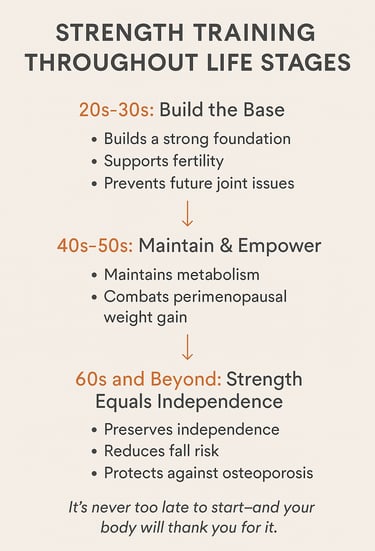Strength training is one of the most powerful and transformative tools available to women—but for too long, it’s been surrounded by myths, intimidation, and outdated stereotypes. Many women are told to stick to cardio or fear getting “too bulky” if they pick up a barbell. In reality, resistance training is not just safe for women—it’s essential. From building lean muscle and improving bone health to boosting confidence and mental clarity, lifting weights can completely reshape how you feel in your body.
This article explores the real, science-backed benefits of strength training for women, debunks common myths, and offers beginner-friendly routines to help you get started. Whether you’re new to fitness or looking to take your workouts to the next level, strength training can help you feel more capable, confident, and empowered—inside and out.


The Benefits of Strength Training for Women
Empowering Workouts
Why Strength Training Is Crucial for Women’s Health
Contrary to outdated beliefs, strength training isn’t just for bodybuilders or men looking to bulk up. Women of all ages can benefit tremendously from incorporating resistance training into their weekly routine. From improving bone density to enhancing confidence, lifting weights can be one of the most empowering things a woman can do for her body and mind.
Key Health Benefits Include:
Increased lean muscle mass: Helps boost your metabolism and burn more calories at rest.
Stronger bones: Vital for preventing osteoporosis and maintaining skeletal health.
Better posture and balance: Reduces risk of falls and injury, especially as we age.
Reduced body fat: Strength training supports sustainable fat loss without sacrificing muscle.
Improved mental health: Releases endorphins and boosts self-esteem.
Busting Common Myths About Women and Weightlifting
Despite strength training becoming more mainstream, many women still hesitate to pick up weights due to long-standing myths and misconceptions. These outdated ideas not only discourage women from experiencing the full benefits of resistance training but also reinforce harmful stereotypes about fitness and femininity. Let’s break down some of the most persistent myths—and why they deserve to be left behind.
Myth 1: “I’ll get bulky if I lift weights.”
Reality: This is perhaps the most common myth—and one of the most damaging. The truth is, women’s bodies are not hormonally designed to bulk up easily. Testosterone, the hormone largely responsible for muscle size, is much lower in women than in men. To gain significant muscle mass, women would have to follow a highly specialized training and nutrition program—often for years.
In reality, strength training helps you build lean muscle, which gives your body a toned, sculpted look. Think strength, not size. Plus, muscle takes up less space than fat, meaning you can look leaner and more defined even as the number on the scale stays the same or increases slightly due to muscle gain.
Myth 2: “Cardio is better for fat loss.”
Reality: Cardio is great for heart health and endurance, but it’s not the most efficient way to burn fat long-term. While a cardio session may torch more calories in the moment, strength training continues to work for you long after the workout ends by boosting your resting metabolic rate—the number of calories your body burns at rest.
Building muscle through resistance training turns your body into a more efficient fat-burning machine. And unlike cardio, which primarily burns calories from both fat and muscle, lifting helps preserve and even grow lean mass. The most effective fat-loss strategies combine both cardio and strength training, but if you had to choose just one for long-term body composition improvements—strength wins.
Myth 3: “Strength training isn’t feminine.”
Reality: Strength and femininity are not mutually exclusive. In fact, the idea that women need to appear delicate or avoid looking “strong” is a social construct—one that’s finally being challenged. Lifting weights can help you feel powerful, grounded, and confident in your body.
Strength training enhances posture, helps you move better in everyday life, and gives you a sense of accomplishment that’s deeply empowering. Whether your goal is to lift your groceries with ease, run after your kids, or feel more confident in your clothes, resistance training supports every version of womanhood.
Myth 4: “I’m too old to start lifting weights.”
Reality: It’s never too late to start strength training—no matter your age. In fact, lifting weights becomes even more important as you get older. Women naturally lose muscle mass and bone density with age, especially after menopause, which increases the risk of falls, fractures, and metabolic slowdowns.
Strength training helps combat these effects by preserving lean muscle, strengthening bones, and improving balance and coordination. It also supports joint health and reduces the risk of age-related conditions like osteoporosis, type 2 diabetes, and arthritis.
Many women who start lifting in their 40s, 50s, and even 60s report not only physical improvements but also a renewed sense of vitality and self-confidence. Age is just a number—your strength journey can begin today.
Mental Empowerment Through Strength Training
Strength training isn’t just about aesthetics—it’s a powerful practice that strengthens both body and mind. For many women, lifting weights becomes a form of therapy, offering structure, purpose, and a renewed connection to their physical selves.
Enhanced body image:
Unlike many forms of fitness that emphasize shrinking or punishing the body, strength training shifts the focus to what your body can do. Whether it’s your first unassisted push-up or hitting a new personal best in deadlifts, this shift from appearance to performance fosters a more positive, empowered relationship with your body. Over time, you'll find yourself appreciating your strength, resilience, and progress rather than obsessing over the scale or mirror.
Stress relief:
Lifting weights provides a structured outlet for stress, frustration, and emotional tension. It has been shown to reduce cortisol (the stress hormone) and increase feel-good neurotransmitters like endorphins and dopamine. Many women find that regular strength sessions improve their ability to manage anxiety, elevate their mood, and even enhance focus and productivity throughout the day.
Increased confidence:
There’s something deeply empowering about setting strength-based goals and watching yourself achieve them—especially when those goals once seemed out of reach. Each new milestone reinforces self-trust, mental toughness, and belief in your own capabilities. This newfound confidence doesn’t stay in the gym—it follows you into your career, relationships, and daily life.
Strength Training and Hormonal Health
Lifting weights doesn’t just reshape your physique—it can also support your internal health in powerful, science-backed ways. Strength training plays a crucial role in hormonal regulation, particularly during key transitions like perimenopause and menopause, when many women experience shifts that affect energy, mood, sleep, and body composition.
Improved insulin sensitivity:
Strength training helps muscles absorb glucose more efficiently, which lowers blood sugar levels and reduces the risk of insulin resistance and type 2 diabetes. For women with PCOS or metabolic syndrome, this can be an especially valuable tool for managing symptoms and maintaining steady energy throughout the day.
Supports thyroid function and metabolic rate:
Building muscle supports a healthy metabolism, which is often impacted by thyroid dysfunction or age-related hormonal shifts. Since muscle tissue burns more calories at rest than fat tissue, resistance training helps prevent the sluggish metabolism many women experience in midlife.
Reduces symptoms of PMS and menopause:
Regular strength training can reduce bloating, mood swings, and fatigue associated with PMS by encouraging more stable hormone levels and promoting better circulation. For women navigating menopause, lifting weights helps alleviate symptoms like night sweats, poor sleep, and low mood by boosting endorphins, supporting bone density, and regulating sleep patterns.
In short, strength training doesn’t just help balance your hormones—it helps you feel more balanced in your life.
Strength Training Throughout Life Stages
One of the most beautiful things about strength training is that it adapts to you—your age, your goals, and your lifestyle. No matter where you are in life, lifting weights can help you move better, feel stronger, and live more vibrantly.
In Your 20s & 30s: Build the Base
These are prime years for laying the foundation of strength, mobility, and body awareness. Strength training during this time boosts energy, supports fertility, helps prevent joint issues, and teaches lifelong discipline. You’re not just working on your body—you’re building a strong future.
In Your 40s & 50s: Maintain & Empower
Hormonal shifts during perimenopause and menopause can cause unwanted weight gain, mood swings, and a dip in energy. Strength training helps counter these changes by supporting metabolism, improving insulin sensitivity, and preserving muscle mass. It’s also a powerful tool for boosting self-confidence and managing stress during this transitional phase.
In Your 60s & Beyond: Strength Equals Independence
This is where strength training truly shines. Lifting weights helps maintain balance, coordination, and bone density—crucial for preventing falls and fractures. Regular strength work keeps you moving freely, supports joint health, and helps you stay independent longer. And yes, you can start in your 60s, 70s, or even later—many women do, and thrive!
It’s never too early—or too late—to start lifting. Your body will thank you now, and even more so in the years to come.


How to Overcome Gym Intimidation
Let’s be honest—walking into a gym for the first time (or after a long break) can feel overwhelming. Between unfamiliar equipment, crowded weight rooms, and that lingering fear of being judged, gym intimidation is real. But here’s the good news: everyone starts somewhere, and you’re stronger than you think. These tips will help you shake off the nerves and walk in like you own the place:
Go in with a plan
Wandering aimlessly only adds to the anxiety. Knowing exactly what exercises you’re doing—and in what order—gives you purpose and direction. Use a written routine, a workout app, or even a sticky note in your pocket.
Choose your time wisely
Gyms tend to be quieter in the late morning or early afternoon. Avoiding peak hours means more open equipment, less pressure, and a calmer vibe to ease into your session.
Wear what makes you feel strong
Whether it’s your favorite leggings or a top that fits just right, the right outfit isn’t about trends—it’s about confidence. Choose clothes that are comfortable, supportive, and make you feel ready to move.
Start in your comfort zone (literally)
Not ready to hit the gym floor yet? No problem. Begin at home with bodyweight exercises, resistance bands, or dumbbells. You’ll build strength and confidence in a familiar setting, so when you do step into the gym, you’ll already know what you’re doing.
Remember: no one is watching you as closely as you think. Most people are focused on their own workouts—and many are silently cheering you on.
Final Thoughts – Strong Is Empowered, Not Masculine
Strength training doesn’t take away from femininity—it redefines it. The idea that strength is reserved for men is outdated and limiting. Today’s woman knows that being strong, physically and mentally, is one of the most powerful forms of self-care. Lifting weights isn’t about changing who you are—it’s about becoming more of who you already are, unapologetically.
When you embrace strength training, you’re not just building muscle—you’re building resilience, self-respect, and a deeper connection to your body. You’re learning to value progress over perfection, effort over appearance, and capability over comparison.
Whether you're chasing your first push-up, rebuilding after pregnancy, navigating menopause, or just wanting to feel more confident in your skin, weightlifting meets you where you are—and helps you rise. You don’t need to be perfect, or even consistent right away. You just need to begin.
Start where you are. Go at your own pace. Celebrate every small win. And always remember: strong women lift each other—and themselves—up.
Take the Next Step: Your Personalized Workout Plan Awaits
Now that you understand the benefits of strength training, it’s time to put that knowledge into action.
Strength Training for Women: Workout Plans for Every Fitness Level
Explore beginner, intermediate, and advanced routines designed to help you train with purpose, build muscle, and gain confidence—no matter where you're starting.

Strength training transformed my confidence and made everyday tasks feel so much easier. Highly recommend it!
Emily S.

I never believed I could lift weights, but now I feel empowered and strong every day!
Sarah J.

